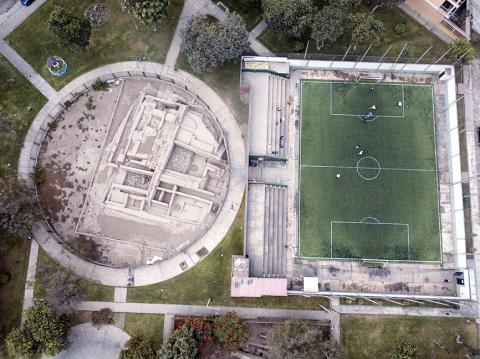From her small home near two golf courses and three slums, Gianina Rojas gazes up at a crumbling adobe pyramid, remnants of the vast Inca empire that flourished more than six centuries ago.
Like many people in modern-day Peru, Rojas was born and raised among Incan sites that were built before the Spanish colonized South America.
Now 26, she recalls treasure hunting as a child — hiding away pieces of ceramic pots, textile scraps and even human bones.

Photo: AP
“Lima is full of places like this,” she said.
The pyramid is just one of thousands of historic sites, or “huacas,” that are being crowded out or destroyed as roads, schools, residential neighborhoods and stadiums are built to meet growing demands.
High-rise apartment buildings tower around one site. Highway traffic barrels through a pair of tunnels newly burrowed under an adobe palace at a 900-year-old cemetery.
One of the few well-preserved pyramids sits across from the mansion of Peruvian President Pedro Pablo Kuczynski, highlighting the creeping pace of urbanization in Peru’s bustling capital.
An estimated 46,000 pre-colonial sites dot Peru’s landscape. About 400 of them are in Lima, which is home to the biggest number of pre-colonial archeological zones of any city in South America.
Yet Peru spends only enough to protect just 1 percent of those sites, according to official data, leaving hundreds of ruins abandoned or relegated to becoming public trash dumps.
“Since the founding of Lima, there has been no relationship between the people and the huacas, beyond seeing them as mounds of earth or places to search for treasures,’’ Lima-based archeologist Hector Walde said.
He spoke while excavating carefully at a 3,500-year-old temple that has walls painted with ancient reliefs depicting mythological animals.
Lima’s first urban explosion in the 20th century was accompanied by large-scale destruction of pre-colonial sites.
The walls of one temple were pulverized to make bricks for new homes beginning in the 1980s, while around that time guerrillas used dynamite to attack an electric tower standing on a pyramid.
Today, a small group of archeologists and officials are stepping up efforts to reverse course and preserve sites being squeezed by urban sprawl.
“The idea is for Peruvians to feel that heritage is something that is enjoyed,” Peruvian Deputy Minister of Heritage Jorge Arrunategui said.
A public awareness campaign he has helped lead since July grants free admission to related museums and dozens of archeological sites across the country, with the hope of reconnecting Peruvians with their heritage.
Officials say a new antiquities law will preserve the nation’s cultural legacy by giving historical sites stronger legal protections, but activists fear it will diminish protections for thousands of sites because the law affects only those designated as archeologically significant by the minister of heritage.
Everyday Peruvians sometimes take their ancient culture for granted, having lived their entire lives alongside the huacas — an indigenous Quechua word meaning “oracle” or “sacred place.”
“Most people do not know how dangerous it is to care for a huaca,” Rojas said. “You have to face land traffickers, thieves and bad people. The worst part is that the state never recognizes or thanks you.”

POLITICAL PRISONERS VS DEPORTEES: Venezuela’s prosecutor’s office slammed the call by El Salvador’s leader, accusing him of crimes against humanity Salvadoran President Nayib Bukele on Sunday proposed carrying out a prisoner swap with Venezuela, suggesting he would exchange Venezuelan deportees from the US his government has kept imprisoned for what he called “political prisoners” in Venezuela. In a post on X, directed at Venezuelan President Nicolas Maduro, Bukele listed off a number of family members of high-level opposition figures in Venezuela, journalists and activists detained during the South American government’s electoral crackdown last year. “The only reason they are imprisoned is for having opposed you and your electoral fraud,” he wrote to Maduro. “However, I want to propose a humanitarian agreement that

ECONOMIC WORRIES: The ruling PAP faces voters amid concerns that the city-state faces the possibility of a recession and job losses amid Washington’s tariffs Singapore yesterday finalized contestants for its general election on Saturday next week, with the ruling People’s Action Party (PAP) fielding 32 new candidates in the biggest refresh of the party that has ruled the city-state since independence in 1965. The move follows a pledge by Singaporean Prime Minister Lawrence Wong (黃循財), who took office last year and assumed the PAP leadership, to “bring in new blood, new ideas and new energy” to steer the country of 6 million people. His latest shake-up beats that of predecessors Lee Hsien Loong (李顯龍) and Goh Chok Tong (吳作棟), who replaced 24 and 11 politicians respectively

Young women standing idly around a park in Tokyo’s west suggest that a giant statue of Godzilla is not the only attraction for a record number of foreign tourists. Their faces lit by the cold glow of their phones, the women lining Okubo Park are evidence that sex tourism has developed as a dark flipside to the bustling Kabukicho nightlife district. Increasing numbers of foreign men are flocking to the area after seeing videos on social media. One of the women said that the area near Kabukicho, where Godzilla rumbles and belches smoke atop a cinema, has become a “real

‘WATER WARFARE’: A Pakistani official called India’s suspension of a 65-year-old treaty on the sharing of waters from the Indus River ‘a cowardly, illegal move’ Pakistan yesterday canceled visas for Indian nationals, closed its airspace for all Indian-owned or operated airlines, and suspended all trade with India, including to and from any third country. The retaliatory measures follow India’s decision to suspend visas for Pakistani nationals in the aftermath of a deadly attack by shooters in Kashmir that killed 26 people, mostly tourists. The rare attack on civilians shocked and outraged India and prompted calls for action against their country’s archenemy, Pakistan. New Delhi did not publicly produce evidence connecting the attack to its neighbor, but said it had “cross-border” links to Pakistan. Pakistan denied any connection to